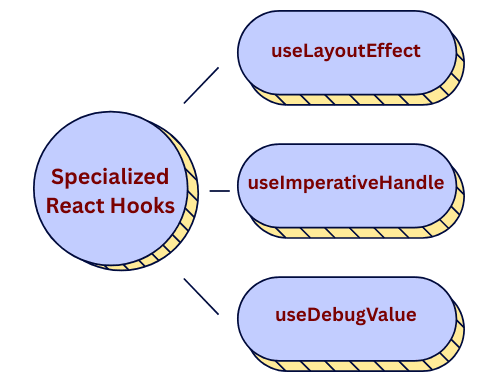Clean • Professional
React provides several specialized hooks beyond the common useState, useEffect, and useContext. These hooks are used in advanced scenarios where you need precise control over DOM, component instances, or debugging custom hooks.
The main specialized hooks are:

useLayoutEffect – Synchronous side effectsuseImperativeHandle – Controlling ref exposureuseDebugValue – Debugging custom hooksuseLayoutEffect is similar to useEffect but runs synchronously after all DOM mutations and before the browser paints the UI.
Syntax:
useLayoutEffect(() => {
// Your code here
return () => {
// Cleanup
};
}, [dependencies]);
Example:
import React, { useRef, useLayoutEffect, useState } from "react";
function Box() {
const boxRef = useRef();
const [width, setWidth] = useState(0);
useLayoutEffect(() => {
setWidth(boxRef.current.offsetWidth);
}, []);
return (
<div>
<div ref={boxRef} style={{ width: "50%" }}>Resizable Box</div>
<p>Box width: {width}px</p>
</div>
);
}
useImperativeHandle works with forwardRef to customize what values or methods are exposed to a parent component via a ref.
Syntax:
useImperativeHandle(ref, () => ({
method1,
method2
}));
Example:
import React, { useRef, forwardRef, useImperativeHandle } from "react";
const CustomInput = forwardRef((props, ref) => {
const inputRef = useRef();
useImperativeHandle(ref, () => ({
focus: () => inputRef.current.focus()
}));
return <input ref={inputRef} />;
});
function App() {
const inputRef = useRef();
return (
<div>
<CustomInput ref={inputRef} />
<button onClick={() => inputRef.current.focus()}>Focus Input</button>
</div>
);
}
useDebugValue allows displaying debug information for custom hooks in React DevTools. It does not affect runtime behavior but helps developers debug hooks easily.
Syntax:
useDebugValue(value);
Example:
import { useState, useEffect, useDebugValue } from "react";
function useOnlineStatus() {
const [isOnline, setIsOnline] = useState(navigator.onLine);
useEffect(() => {
const handleOnline = () => setIsOnline(true);
const handleOffline = () => setIsOnline(false);
window.addEventListener("online", handleOnline);
window.addEventListener("offline", handleOffline);
return () => {
window.removeEventListener("online", handleOnline);
window.removeEventListener("offline", handleOffline);
};
}, []);
useDebugValue(isOnline ? "Online" : "Offline");
return isOnline;
}
| Hook | Purpose | Typical Use Case |
|---|---|---|
| useLayoutEffect | Run synchronous side effects after DOM mutations | Measuring DOM, layout adjustments, avoiding flicker |
| useImperativeHandle | Expose specific methods or properties to parent via ref | Child component APIs, encapsulation |
| useDebugValue | Display debug info for custom hooks in DevTools | Debugging complex custom hooks |